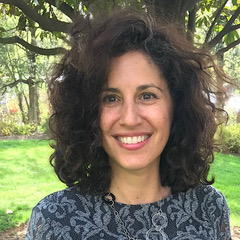Designing products to last: Rachel Goldstein introduces students to the circular economy
November 16, 2021

By Lindsay Key
Have you ever wondered where your discarded belongings—your old shoes, used shampoo bottles, e-commerce packaging, and broken DVD player—end up? Unless you found a way to reuse, repurpose, or recycle them, they went to a landfill to sit for the next several decades, taking up space and emitting methane and carbon dioxide into the air. Landfill gas contributes to climate change and creates smog, if not controlled, and is unpleasant for people who live near them.
But sustainability experts are working to improve waste management and recycling practices not only by capturing landfill gas for renewable energy, but also by designing more sustainable products and packaging that don’t end up in a landfill in the first place. Rachel Goldstein has plenty of experience with both approaches: knowledge that she now brings to Virginia Tech’s Master of Natural Resources (MNR) students in her Circular Economy online course.
Bringing business expertise to sustainability education
The course challenges students to envision an economic system that looks beyond the conventional linear model of “take–make–waste” to a future that is restorative and regenerative of resources. They learn about the systematic shifts that need to take place in global markets—including business, government, and civil society organizations—in order to transition to a circular economy.
Rachel recently joined Virginia Tech’s online MNR faculty as an Assistant Professor of Practice. Currently, she is the North America Policy Director at Mars, Incorporated, leading U.S. advocacy on a variety of policy issues relating to the company's Sustainable in a Generation Plan, including efforts to advance sustainable packaging. She has also held roles on the central sustainability team, specifically covering plastic packaging issues, and led sustainability for Scientific and Regulatory Affairs.
Before this, she led the Landfill Methane Outreach Program (LMOP) at the Environmental Protection Agency. The LMOP is a voluntary climate change program that encourages methane emissions reductions through the capture and beneficial use of landfill gas. She was the lead for this work in India, China, and Southeast Asia under the Global Methane Initiative. She holds an MBA with an Environmental Management Concentration from George Washington University, and a B.S. in Human Factors Engineering from Tufts University.
Practical applications of a mindset change
Designing products to have a cradle-to-cradle life cycle rather than a cradle-to-grave cycle is a passion that Rachel sees her students really engaging with in her course. Early in the course, they discuss the basics of the circular economy and the challenges and opportunities of recycling, re-use, and redesign.
“We’re starting to realize that a lot of what is recyclable isn't getting recycled,” said Rachel. “So, why is that? What existing and emerging technologies are available to recycle the materials placed on the market today and into the future? What do we need to change to improve recycling rates? We discuss these topics in the course.”
Many products are discarded because it is often less expensive to buy a new one rather than repair it, says Rachel. “One burgeoning sustainability movement that students will learn about is the right to repair,” she explained. “The idea is that, if we want to improve the circularity of products, we should develop products that can be repaired by the consumer, instead of requiring the consumer to buy a new product if the original product becomes dysfunctional.”
For the final group project, students are asked to pick an industry, such as electronics, fashion, or food, and examine how it could be made more circular, eventually creating a business plan for a new circular delivery model. “We’ll talk about metrics and tools they can use for creating a more sustainable business plan, and also examine the role that policy plays when moving from a linear to a circular economy,” said Rachel.
Why do sustainability students need a business perspective?
Circular Economy is one of four online courses comprising the Sustainable Business focus area, a concentration of study for students looking for a deeper dive into a specific topic. Others include Business Sustainability Applications, Sustainability Accounting and Reporting, and Sustainable Purchasing and Supply Chains. Program Director Dr. Kieran Lindsey said that the suite of courses was created to give working professionals the knowledge and skills necessary to lead successful sustainability initiatives.
“Based on enrollment, our students have been quick to recognize the value of these new offerings. I’m convinced the MNR program’s focus on systems thinking helps them to recognize that a circular economy approach is inherently more attuned to the achievement of ambitious sustainability goals than a linear economy model. Naturally, they want to learn how to implement these concepts in their own organizations."

Rachel Goldstein is the North America Public Policy Director for Mars, Incorporated. Rachel leads advocacy on a variety of policy issues, specifically relating to their Sustainable in a Generation Plan. In her ten years with Mars, she has held roles on the central sustainability team, specifically covering plastic packaging issues, and led sustainability for Scientific and Regulatory Affairs. Rachel led the development of the Mars Global Protocol for Sustainability Claims, advising the business on communicating complex sustainability topics to consumers. She has experience with external sustainability reporting work across a range of platforms and disclosures, such as the DJSI, CDP, customer scorecards, and the Ellen MacArthur Foundation’s Global Commitment. She has led external engagement in key partnerships, such as the Ellen MacArthur Foundation, the Sustainable Packaging Coalition, and the Sustainability Consortium. Rachel is on the Board of Directors for GreenBlue, an environmental nonprofit dedicated to the sustainable use of materials in society.


